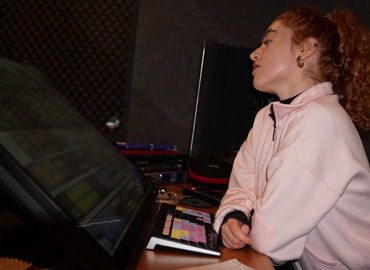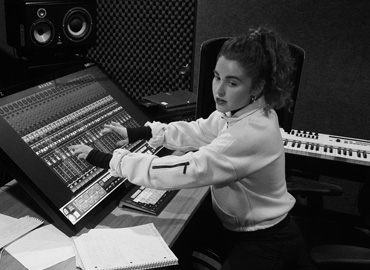
Artist Profile: Koda Corvette
SINGER // SONGWRITER // DANCER // PRODUCER // ACTRESS
IMSTA: Hey Koda, do you mind if you tell us a little bit about yourself?
KC: Hello! I'm a singer-songwriter and producer in LA, originally from Portland, Oregon. I've been doing music almost my whole life and come from a musical family that always had classic records on in the house. It's my greatest passion and it's been a major outlet for me growing up.
IMSTA: How long have you been writing songs?
KC: I've been writing since I was 9, but the earliest songs weren't very good. :) The first ones I wrote were on sticky notes by habit and I still have the folders crammed full with hundreds of those sticky notes. Whenever I experience a writer's block, I'll go back through the archives of old sessions and see if there are any sections or hooks to steal from a song about butterflies, but then change the lyrics and rewrite the rest.

IMSTA: That's adorable, and I'm glad you can still find inspiration from your younger self. How would you describe your style of music?
KC: Never the same, dramatic, .. majestic? Haha. I always gravitate towards winding melodies. Those over dancey pop/R&B beats with a tinge of rock. I love playing with vocal textures, lush harmony stacks, and incorporating stuff that I picked up from classical and jazz background as a kid. Piano is my main instrument so that's the skeleton of every song.
IMSTA: Who would you say are some of your favorite or most influential musicians?
KC: Freddie Mercury, MJ, Beyonce, Lady Gaga, NAO, Prince, David Bowie, Arctic Monkeys, The Beatles, and lately I've been listening to the wonky prog melodies of Supertramp too. I admire musicians and strong vocalists that are transformative and able to experiment a lot. The musicianship of these artists lent to the defining elements of their songwriting that heavily influenced mine.
IMSTA: Can you tell us about any gear or software you use personally?

KC: I use the Slate ML-1 Vintage mic and I love being able to simulate popular mic models through the Slate plugins. My go-to's are the Sony C-800 and C-800M simulations, as well as Blackbird Studio's Telefunken 251. Some of my favorites are the FG-2A opto compressor (simulating Teletronix LA-2A), FG-116 FET compressor (after the 1176), Eiosis AirEQ, FabFilter Pro-Q3 EQ, and Revival saturation, because I want to crisp those airy high ends while still delivering warm depth and body. My vocal set-up is mostly digital with the exception of a Grace Design M103 channel strip and RME Fireface II UFX+ (Thunderbolt) recording into ProTools. I do want to build a patch bay and work with more analog gear. Most of the time I'll create the beats and instrument tracks through MIDI keyboard or Maschine Studio, utilizing VST/AAX plug-ins from Native Instruments + Arturia. ProTools is the DAW I've been using since I was 12 and it's the one I'm most comfortable with because I learned everything I know about production with PT by trial/error, online tutorials, and years of no sleep.
IMSTA: Your passion is very refreshing Koda, can you tell us about the story and process of your finalist song entry, “Peachy Silky”?
KC: This was a pitch demo in the style of Mahalia, Thundercat, and other R&B pop artists that have a summer-y flavor in their music. I was aiming for 90s vibes and to create a chilled, charming song that you could kickback to with your friends.

IMSTA: How did you hear about IMSTA? / Have you ever been to IMSTA FESTA?
KC: I walked in to one of the production schools they were hosting the IMSTA conference at in DTLA. This was 2019, a friend forwarded me a facebook flyer about the event that day so I decided to go check it out. I saw they were having a listening session of songs entered in a contest, got in line and played an mp3 for them on the spot, then was chosen as a wildcard from Mischke. At the end of that day I won 2nd place and further linked with the judges.
IMSTA: What do you think about IMSTA’s message?
KC: I think it's an incredible association that supports aspiring artists, songwriters, producers and audio engineers via the rapid evolution of music technology. I also appreciate how you offer educational resources and industry opportunities. Developing your sound through software + gear is a whole journey of its own. It's crazy to me to look back through my sessions or past recording set-ups and see how much I've grown.
IMSTA: What advice would you give to someone who wants to become a songwriter?
KC: I would say listen to as much music as possible, across all genres and time periods because you never know what you come across that will inspire you. Also setting some challenges for yourself like writing 1-10 songs a day or 5 songs a week for example. Putting these bulk ideas onto audio notes and sessions without caring whether they're good or not will help get into a creative rhythm and muscle memory. Of course there's a basic pop song structure and variations on the theme. But outside of following a pop structure for the majority of songs, I try to avoid rules or courses teaching how to properly write a song and what is commercially wrong or right. That's art, you have to follow your intuition and what fuels the inner fire. So I fiercely believe that's how you develop a songwriting style unique to your voice.

For more of Koda Corvette, please check her out on her links below:





